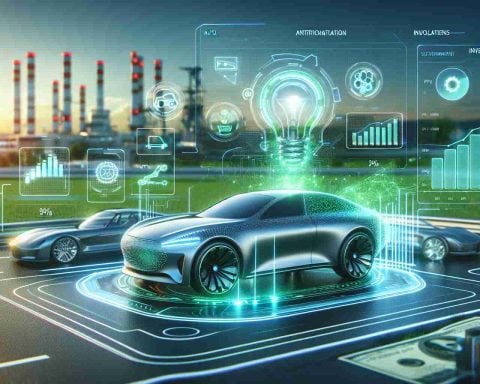Introducing the Future of EV Charging
The landscape of electric vehicle (EV) charging is evolving rapidly, driven by innovation and technology. Tesla’s Supercharger network remains the leader in the U.S. for EV charging, with its connector now established as the North American Charging Standard (NACS). However, one persistent issue is the short cords designed primarily for Teslas, which don’t accommodate all EV models.
A2Z’s Innovation
Recognizing this gap, A2Z, a prominent supplier of EV charging equipment, is set to launch an extension cable designed specifically for the NACS. This cable aims to enhance accessibility while addressing thermal management concerns that could compromise safety. The upcoming extension is set to be five feet long and will weigh approximately seven pounds.
Testing and Features
A2Z’s prototype has been tested on various EV models, including popular options like the Chevy Bolt EV and the Hyundai Ioniq 5, showing that it effectively connects to different charge ports without any issues. Equipped with four thermal sensors, it can proactively manage electricity flow and prevent overheating, thereby ensuring a safer charging experience.
Availability and Pricing
The CEO of A2Z announced plans for a testing program, with a market launch expected this summer. The prototype extension cord, currently listed for $284, allows for a seamless connection to Tesla’s Supercharger network, making it a crucial accessory for non-Tesla EV owners. Preorders are anticipated soon, pending safety certification.
Impacts on Society and the Environment
The evolution of electric vehicle (EV) charging technology heralds significant societal and cultural shifts, particularly as the adoption of EVs accelerates globally. The enhancement brought by solutions like A2Z’s innovative extension cord not only fosters greater inclusivity among different EV models but also supports the growing consumer demand for sustainable transportation alternatives. This accessibility enables a broader demographic to participate in the transition towards electric mobility, ultimately reshaping automotive consumer behavior.
As the global economy steadily moves away from fossil fuels, the demand for innovative charging solutions becomes paramount. The proliferation of efficient charging infrastructure can stimulate local economies by fostering job creation in technology development, manufacturing, and installation. Moreover, cities may see a revitalization of public space, with the possibility of integrating charging stations into urban planning, thus promoting car-free lifestyles through enhanced public transport systems.
On the environmental front, the switch to EVs contributes significantly to reducing greenhouse gas emissions. However, the production and disposal of charging equipment raise considerations about lifecycles and emissions associated with manufacturing practices. As we move forward, prioritizing sustainable materials for products like charging cables will be pivotal. Future trends point toward smart charging solutions, integrating renewable energy sources, thereby fortifying the resilience of our energy systems while tackling climate change head-on. Long-term significance lies in establishing a collaborative framework between manufacturers, consumers, and governments to ensure a balanced approach to innovation that benefits all.
Revolutionizing EV Charging: A Game-Changer for All Electric Vehicle Owners
The electric vehicle (EV) ecosystem is advancing at an unprecedented pace, with innovative solutions emerging to address the immediate needs of both EV users and manufacturers. As Tesla continues to dominate the market with its extensive Supercharger network, other companies are entering the fray to enhance user experience across all EV models, ensuring they are equipped for the future of transportation.
The Expansion of EV Charging Accessibility
While Tesla’s Supercharger remains a key player, the issue of compatibility with various EV models due to the short charging cords has become a significant concern. A2Z, a pioneering supplier in the EV charging market, is stepping up to tackle this challenge. Their new extension cable, specifically designed for the North American Charging Standard (NACS), aims to bridge the accessibility gap for non-Tesla EV owners.
Innovative Features of A2Z’s Extension Cable
One of the standout features of A2Z’s extension cable is its advanced thermal management system, which utilizes four thermal sensors. These sensors are designed to monitor and manage the electricity flow, effectively preventing overheating during charging sessions. This innovation not only enhances safety but also optimizes charging performance for a variety of electric vehicle models, including popular choices like the Chevy Bolt EV and Hyundai Ioniq 5.
# Pros and Cons of A2Z’s Extension Cable
Pros:
– Enhanced Compatibility: Designed to work seamlessly with multiple EV models, making charging more accessible for everyone.
– Safety Features: Proactive thermal management with built-in sensors reduces the risk of overheating.
– Lightweight Design: At approximately seven pounds, the extension cable offers portability without compromising durability.
Cons:
– Pricing Concerns: At $284, the cable may be considered pricey compared to standard charging solutions.
– Dependency on Certification: Availability is contingent upon passing safety certifications, which could delay market entry.
Market Trends and Insights for EV Charging Solutions
As the demand for electric vehicles continues to grow, the need for versatile and user-friendly charging solutions becomes paramount. A2Z’s upcoming extension cable is a response to this trend, signaling an industry shift towards more inclusive technology that caters to a diverse range of EV owners. The predicted expansion of EV charging infrastructure paired with technological advancements indicates that we are on the cusp of a new era in sustainable transportation.
Pricing and Availability Timeline
A2Z plans to initiate a testing program soon, aiming for a summer launch for their extension cable. Interested consumers can look forward to preorders, although they will have to wait for the completion of safety certifications first. At a price point of $284, the product aims to align with the market needs and reliability expectations of modern EV users.
For more information on electric vehicle innovations and updates, visit Electric Vehicle Info.



















